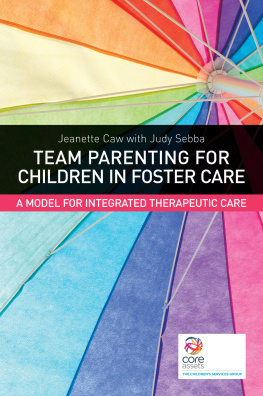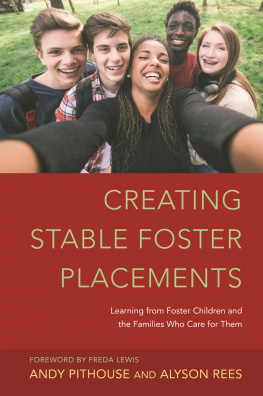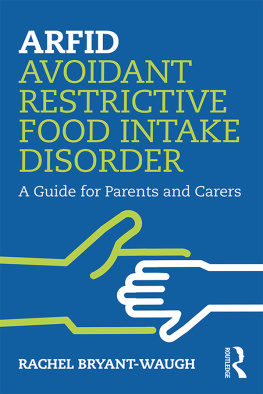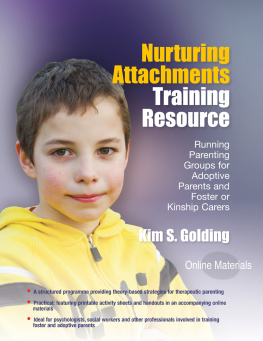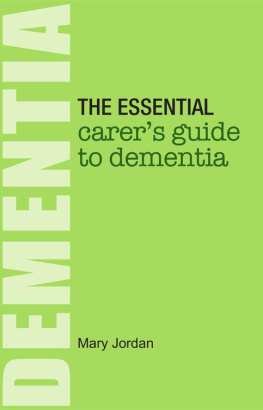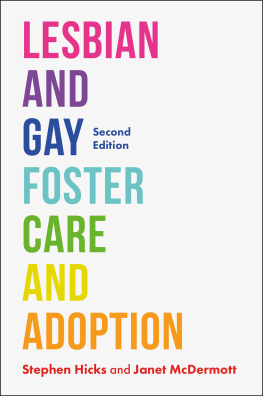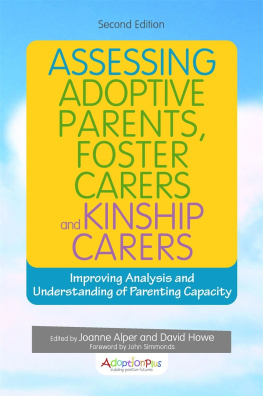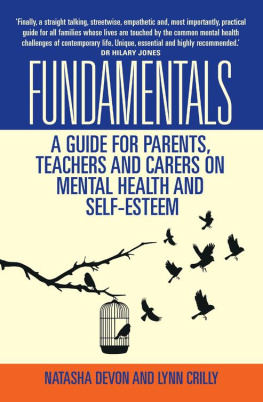ASSESSING ADOPTIVE PARENTS,
FOSTER CARERS
and KINSHIP
CARERS
Improving Analysis and Understanding
of Parenting Capacity
Second Edition
Edited by
Joanne Alper and David Howe
Foreword by John Simmonds
Jessica Kingsley Publishers
London and Philadelphia
CONTENTS
FOREWORD
John Simmonds
Creating a family life for a child through adoption or fostering is in many respects quite extraordinary. It is probably a heartfelt conviction for most of us that falling in love with a baby naturally brought into the world is fundamental to their development and wellbeing. We have come to understand in a lot of detail what falling in love might mean, why it is so important and what some of the complexities might be but the detail of the science cannot obscure the power of that fundamental belief in the place of love. Family placement, especially permanent family placement whatever the legal order that might frame it relies quite heavily on the power of love even if it might be more comfortably expressed using concepts like attachment. Becoming a carer or facilitating somebody to become a carer has at its heart the intimate, intricate world of human relating and relationships. It is this that children expect and need and it is our responsibility to provide it.
We know, and this is conveyed very powerfully in the chapters in this book, that falling in love may not be so straightforward when children have been removed from their birth parents and placed in foster care or for adoption. It is likely that those children will have adapted to a series of significant adversities in their lives both pre and post birth. Their expectations of the world and particularly the people in their lives will have defensively adjusted to these adversities. The degree to which it is possible and what it takes for children to re-adjust to more hopeful and positive expectations are difficult questions for professionals, adopters and foster carers. We know from experience that many children do positively adjust but for some this only happens to a very limited extent and the impact on carers in terms of their subsequent re-adjustment stress, disappointment, conflict or maybe breakdown can be very demanding.
The focus of this book is on one critical aspect of these challenging questions: the assessment of prospective adopters and foster carers. There could not be any more significant professional task than to assess and then make a prediction of what is likely to happen if prospective carers are approved and then have a child or children placed with them. As this book makes clear, it is part art and to a limited extent, science. We have come to understand something of the challenge for these carers and indeed for the children but we are relying on our sense of what the issues are and what they are likely to become rather than any sense of being able to predict outcomes with certainty. The one thing that is absolutely clear is that the process of assessment and approval is only the beginning of a life journey it opens the door and for some it may close it, but what is to be found on the other side needs as much, if not more, attention, time, resources and support.
Each one of these chapters discusses in considerable detail what the current state of play is both for the art and the science of assessment. We need more people to fall in love with these vulnerable children and answering the question of what the role of the professional is to be in their task of enabling this could not be more important.
The new edition addresses some important questions about the assessment of kinship carers. While family members have a different position when it comes to the long-term care of their children to stranger carers enshrined in societal norms and law that family are best this does not diminish the importance of providing them with the support, insight and opportunity that can come from the best in assessment. This is a timely addition to an already comprehensive exploration of the issues.
John Simmonds
Director of Policy, Research and Development,
British Association for Adoption and Fostering
CHAPTER 1
Introduction
Joanne Alper
This book has been designed to be helpful to busy social workers who are committed to working effectively, perceptively and supportively with prospective adopters, foster carers and kinship carers. Assessing prospective adoptive parents, foster carers and kinship carers poses many challenges for practitioners keen to find and support parents for children. In our assessments, we have to understand the needs of children, be clear about the qualities needed in parents and ensure that people feel comfortable talking about these matters. We have to be able to write about all of this clearly and concisely in a report submitted to a panel or a court. And all of this has to be completed within a specified time limit. Additionally, we have the complexities and vagaries of human nature with which to contend as we recognise that different people behave differently under the stresses and strains of parenting. Parenting a child who has experienced trauma, of course, can bring its own particular demands and challenges. How is a particular adult, whether they have had experiences of being a parent or not, likely to respond to these special, usually unanticipated challenges? How can we, as social workers, assess their likely responses and help them as parents understand and imagine themselves in these as-yet-unknown parenting situations?
As a social worker working in this field for a number of years I thought that it would be helpful to bring together a small group of key international experts who could help shed light on some of the dilemmas we face and deepen our understanding of the process of analysis and assessment. Given current thinking in developmental theory and research, it seems clear that understanding the links between our brains, our responses, our own attachment patterns and our relationship experiences can enhance the way we think about, understand and assess people as prospective adopters. In order to ensure that we do the best job possible, I want to argue that the assessment process is not just about whether someone should be approved as an adoptive, foster or kinship parent, but also about what strengths and vulnerabilities they are likely to bring to their parenting role. Specifically, we need to recognise and understand how they would be likely to react and cope under stress, and anticipate what skills and supports they would find most helpful at such times.
The skills required of the social worker in carrying out this work are of a high order. As professionals, we are responsible for providing parents for children who have already suffered significant hurt by their birth parents. Parents who should have been there to love them, care for them and protect them have neglected them and harmed them. Its difficult to imagine how children in these traumatic situations begin to make sense of and resolve these deeply damaging experiences.
Fostering, adoption and kinship placements can offer these children a second chance: a second chance to understand and experience what it is like to be truly cared for and safely looked after, what it is like to be meaningfully and lovingly connected to another human being, what it is like to be able to rely on them and experience a healthy relationship, and what it is like to be able to regulate and manage your feelings in the context of a caring relationship. Adoptive, foster and kinship families have the chance to make a huge, immeasurable impact on the whole life of another human being. As social workers, we can play a central role in making those chances happen.




